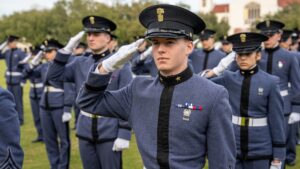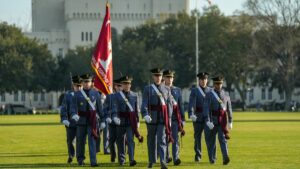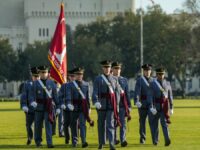
As seen in The Post and Courier, by Caitlin Bell
While the general perception of spies and espionage is conflated with secrecy, The Citadel is working to dispel conspiracy and invite the study of open-source information in the college’s largest single major.
In doing so, the Charleston-based military school has acted on newly recommended intelligence strategies from the federal government, becoming the first U.S. college or university to act on the goal of the Office of Director of National Intelligence to enhance partnerships with academia and industry, according to Citadel officials.
The school recently hosted a conference on open-source intelligence months after ODNI released its six-goal strategy for the federal Intelligence Community to focus on in the coming years. In essence, open-source intelligence involves gathering and analyzing publicly available information found posted on social media, collected in databases and buried in government records.
Students heard from nearly every “three-letter” intelligence agency — the CIA, FBI, DHS and more — as well as those in the private sector, including Microsoft, AT&T, security and defense contractor QinetiQ U.S., and Parsons Corp., a technology-focused defense, intelligence, security and infrastructure engineering firm.
While the process of gathering intelligence, or collecting information that can benefit the missions of the federal government, has been in practice for decades, a newly emerging understanding of open-source information has spurred changes in study.
For those working in the intelligence field, open-source intelligence, or OSINT, is a vital, unclassified tool.
When Melissa Graves began teaching over a decade ago, the curriculum denoted OSINT as a valuable asset but didn’t necessarily teach students how to get it, she said.
“The shift I’ve seen has been the feeling that we need to prepare the students to know everything that they can about intelligence,” said Graves, head of The Citadel’s Department of Intelligence and Security Studies.
Anyone can collect and analyze intelligence, especially students, she said.
“In fact, the only thing that’s really standing in the way of you and good analysis is just your skill set,” Graves said.
Pros of military education
When considering methods of collection and the skills required to utilize intelligence, several federal agencies provide oversight to the training processes of intelligence agents.
Following the U.S. terrorist attacks on Sept. 11, 2001, Congress ordered a thorough investigation and examination of the nation’s intelligence community, headed by the 9/11 Commission. When it released its final 585-page report in 2004, one of the key recommendations was to create a presidential cabinet-level position of Director of National Intelligence.
Today, the Office of the Director of National Intelligence, or ODNI, leads the federal intelligence community and produces the President’s Daily Brief — a top-secret rundown given to the U.S. president each morning containing highly classified intelligence information and analysis.
In March, the ODNI, in partnership with the CIA, released an official strategy outlining how the intelligence community and their partners should utilize open-source intelligence. The strategy makes explicit mention of a necessary collaboration between the federal government, the private sector, foreign allies and academia.
It’s that request for collaboration between academics and the intelligence community that sparked The Citadel faculty interest in an event to bring that strategy plan into action.
While countless U.S. universities have intelligence studies programs, The Citadel’s standing as a public military college sets it apart.
“I think I’ve always seen the value added of a military education,” student Cadet Sgt. Sean Kelly told The Post and Courier. He is majoring in Intelligence Studies.
Both the opportunities he’s been given as a sergeant mentor to freshman cadets and the breadth of learning he receives in and outside of the classroom sets The Citadel apart from other, non-military academic spaces, Kelly said.
Nearly a third of cadets go into the military, said Frank Emerson, The Citadel’s Gov. John C. West Chair of International Politics and American Government. Military and intelligence go hand-in-hand, which provides an important background of understanding for cadets already entrenched in military training, he said.
Emerson would know.
He served internationally with the Central Intelligence Agency and Department of State, leading an intelligence center in South America to disrupt and dismantle terrorist and drug trafficking organizations and as a diplomat/lawyer in Europe leading legal and policy engagements to enhance international criminal prosecutions.

 Looking ahead to the major events of 2026-27
Looking ahead to the major events of 2026-27 Photos from campus: January in review
Photos from campus: January in review Upcoming News from The Citadel – February 2026
Upcoming News from The Citadel – February 2026

